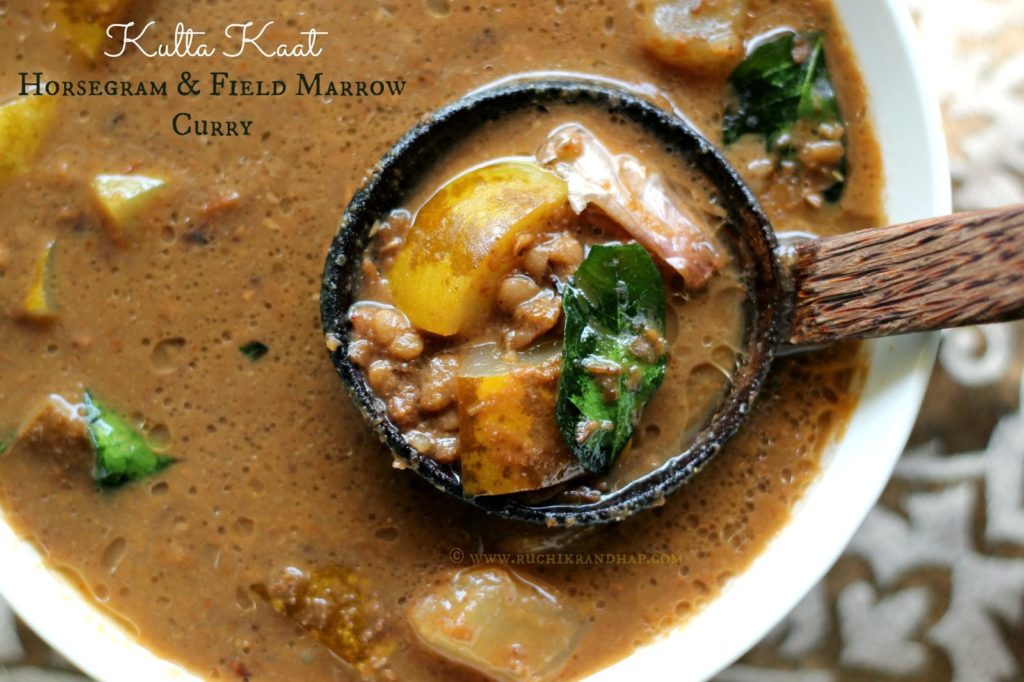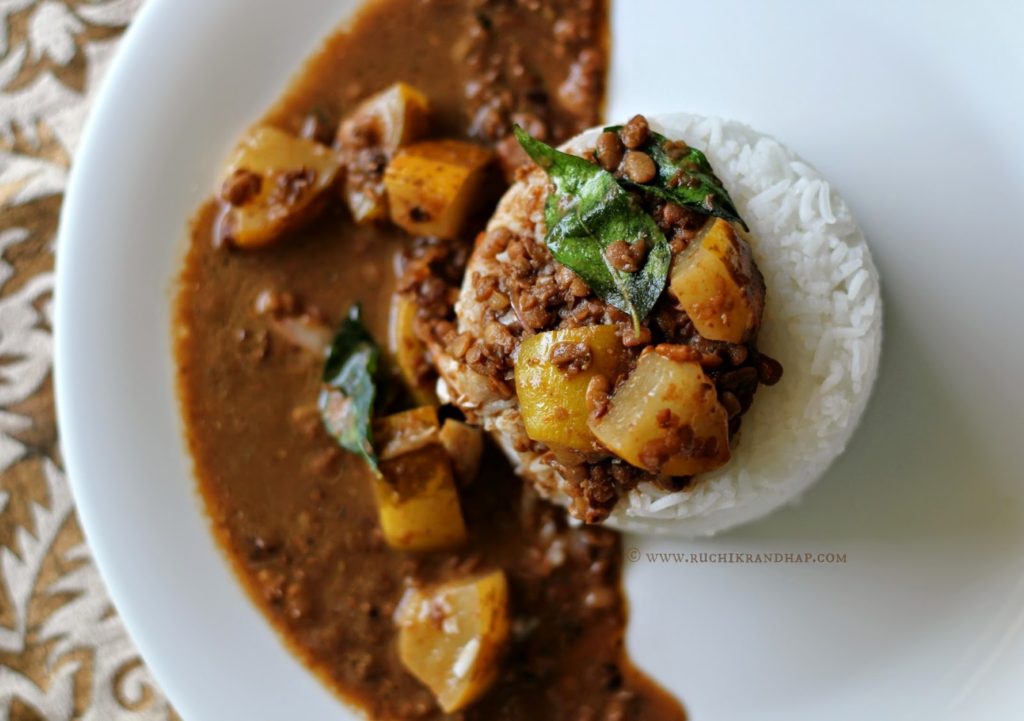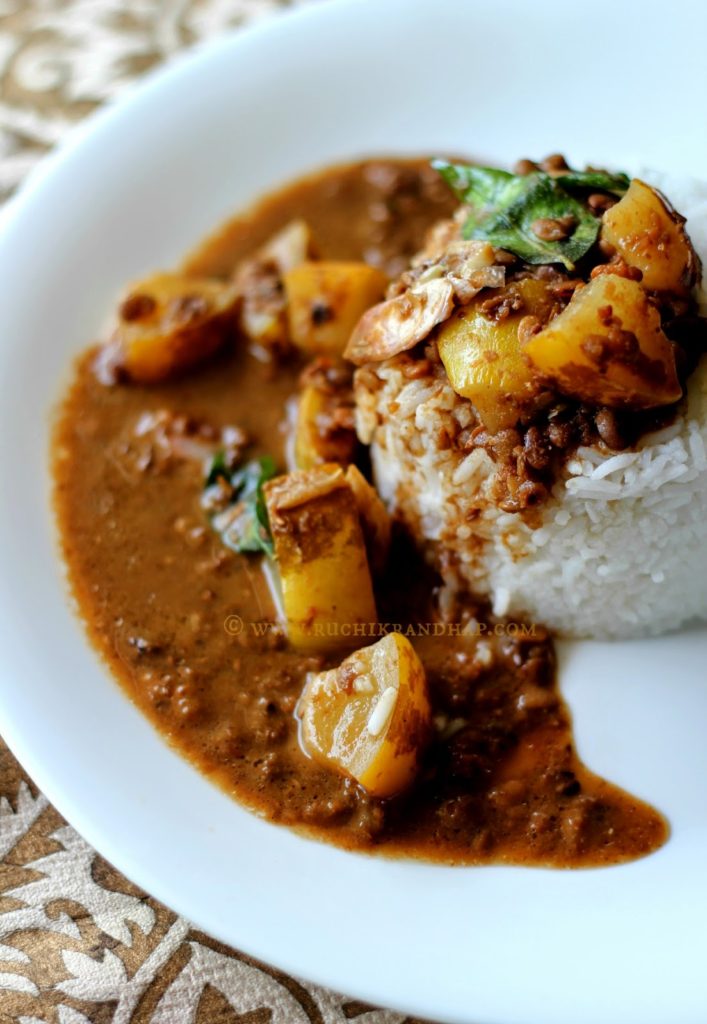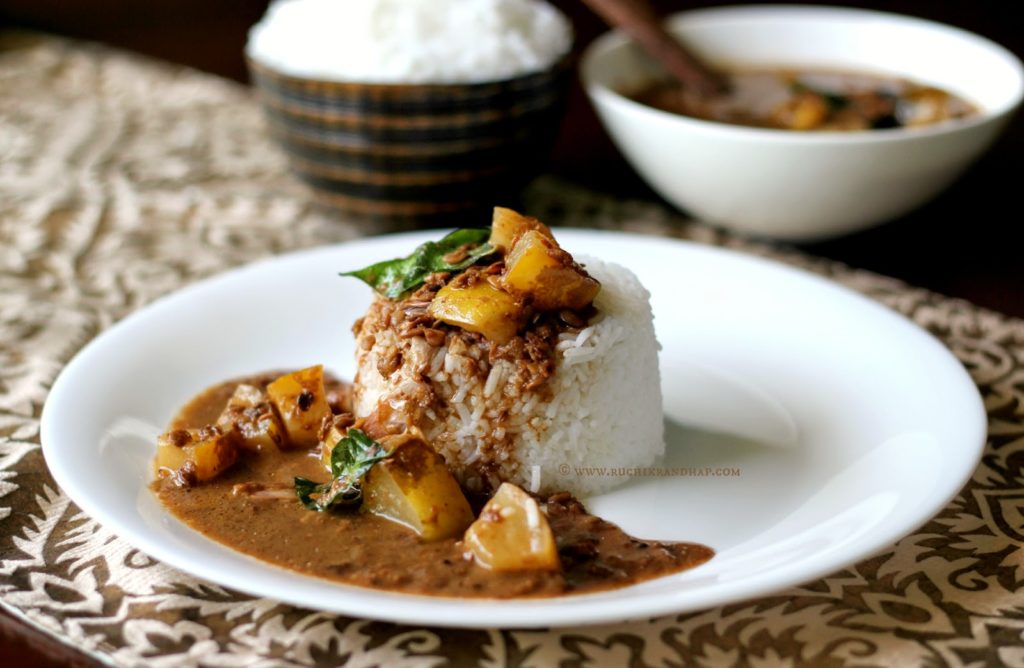Kulta Kaat (Traditional Mangalorean Horse Gram & Field Marrow Curry)
Prep time: 20 mins | Cook time: 15 mins | Serves 4-6
Ingredients:
- 1 cup horsegram (kulith/kulath)
- 1 small field marrow/ Mangalore cucumber/ mogem/magge/sauthe kai
- 4 cups water
- 2-3 teaspoons of powdered jaggery (adjust to taste)
- salt to taste
- 4 long dry red chillies (Byadge/Bedgi variety) * see notes
- 5 peppercorns
- 3/4th teaspoon mustard
- 4-5 garlic flakes
- 2 teaspoons grated coconut (optional)
- 1 marble size ball of tamarind (adjust to taste)
- 1 sprig curry leaves
- 3 garlic flakes with skin, lightly bruised
- 1-2 tablespoons ghee or oil (preferably coconut)
1. Wash and cut the field marrow in quarters. Scrape off the pith and seeds (‘girope’ in Konkani) and cut into medium sized cubes. Keep aside.
2. Heat a skillet/tawa and dry roast the horsegram for a few minutes on a low heat till you get a nice aroma. Take care not to burn it. Remove, allow to cool and then coarsely pound till they are broken lightly. This is an optional step.
3. Transfer the horsegram into a pressure cooker. Add 4 cups of water and salt to taste and pressure cook for about 5-6 whistles. Remove from heat and let the cooker cool down. Open and check if it is tender, if not, place it on the heat again and let it cook for another 2 whistles.
4. When the horsegram is cooked, you can remove 2-3 tablespoons aside on a small plate and spread it out to cool – we need to grind this as it will give some texture and thickness to an otherwise watery gravy. When it is cool enough, grind to a smooth paste. Again this is an optional step.
5. To the cooked horsegram add the chunks of field marrow and cook till tender. You can also cook it under pressure but be careful to remove the cooker from the heat as soon as one whistle goes off or else the the field marrow will overcook.
6. When the field marrow is cooked add the ground masala and a little extra water if required (about 1/2 cup), adjust the salt to taste. Add some more tamarind juice if required and bring the mixture to a boil.
7. Add the ground horsegram (step#4) to the curry and simmer for a minute. Add the jaggery if using and adjust the flavours (salt & jaggery). Remove the pan from heat.
8. In smaller pan heat the coconut oil for tempering. Add the crushed garlic and the curry leaves and toss them around for a few seconds. Pour this into the curry and cover the pan immediately.
9. Serve hot with rice
Notes:
1. This curry is medium spicy, if you want to tone down the spice use chillies without their seeds. Use the Bedgi/Byadge/Kumti variety of chillies for authentic taste.






Nostalgic
What a coincidence Shireen. Today I made Sprouted Kulith & found that you had posted the Recipe for Taute & Kulith Curry. I use kulith in Basale also. Thks Shireen for the recipe . Take care 🙂
@ Preeti: Thank you!
@ Vanita Amin: Nice coincidence 🙂 Adding kulith to basale is a great idea! Never knew of that variation, I shall definitely give it a try! Thanks for the tip!
Loved it Shireen…wanted to try this nd bookmarking
Nice authentic recipe Shireen
yummy!!
Thank you Hasna, Vimitha & Creative Mind 🙂
Hi you have mentioned jaggery in your ingredients but can’t find it in recipe where you have used it? Is it necessary to be used
Hi Michelle
Sorry, I missed to mention it. I have updated it now in step#7. It is optional but recommended!
Shireen: Would you mind giving me instructions for cooking this dish stove-top? Thanks, Dido.
Hi Dido,
Boiling legumes on stove stop is a long process. I have never cooked it this way, always pressure cooked. So I guess 30 minutes or so should do the trick.